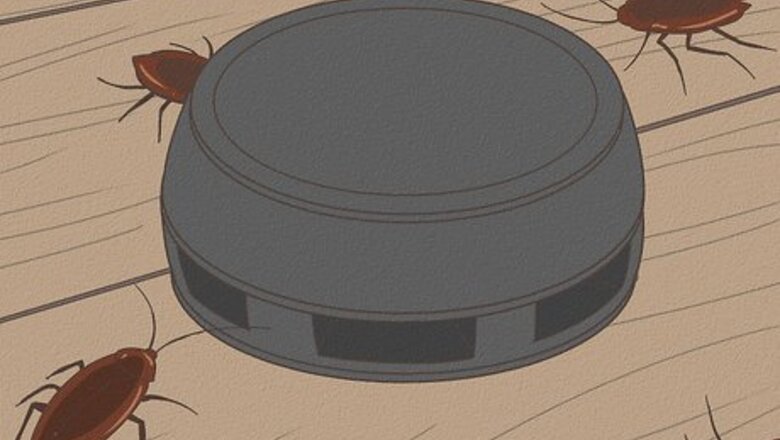
views
- Put adhesive traps in cabinets, under large appliances, and in the corners of a room to stop cockroaches in their tracks.
- Leave out bait traps so roaches bring pesticides back to the nest to kill the entire infestation.
- Spray roaches with insecticide or a concentrated liquid roach killer to kill them on contact and deter them from the area.
- Try dusting diatomaceous earth or boric acid along cracks and crevices to use them as natural pesticide powders.
Leave bait stations in problem areas.
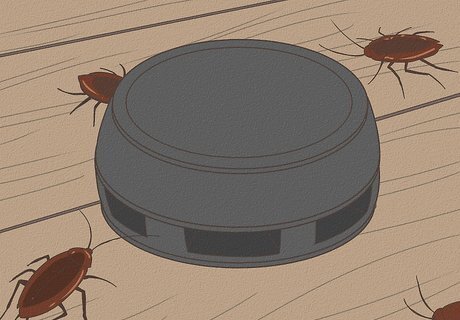
The food in bait stations contains pesticides that slowly kill roaches. Place the bait in an area where you know cockroaches will encounter it, such as along baseboards, under the sink, and in corners. When the roaches eat the poisoned bait, they’ll bring it back to the nest to help get rid of the infestation. Bait stations may take several weeks to kill all of the cockroaches since their eggs could hatch after you get rid of them. Alternatively, look for gel baits that you can apply under the lip of your counter or hinges of your cabinets.
Apply liquid concentrate pesticide near entry points.
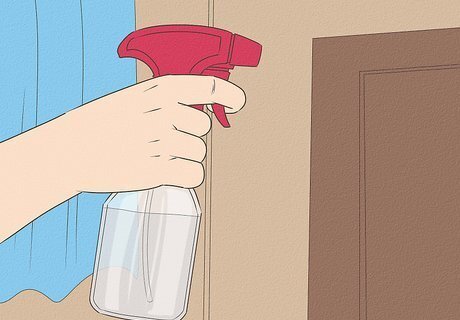
Using liquid roach killer helps you control the toughest infestations. Follow the exact mixing instructions on the pesticide to dilute it properly since they may vary between brands. Once it’s mixed, use an aerosol sprayer or a mop to apply a thin layer onto the surfaces where you’ve seen the most roaches. Focus on cracks or crevices around your cabinets, spaces under large appliances, and the edges of your basement. Keep pets and children away from any areas where you apply pesticides since they can be toxic. Concentrates can be particularly effective at preventing reinfestation since they usually deter roaches for 1-2 weeks or more.
Kill roaches on contact with insecticide spray.
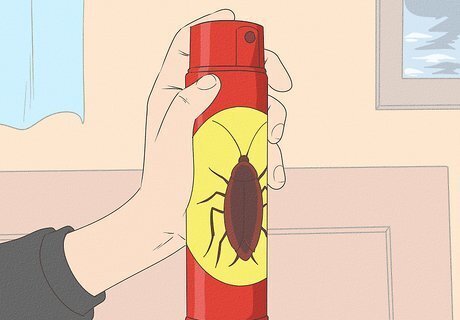
Get rid of roaches you see with a quick spritz of insecticide. Use a spray specifically labeled for roaches since it will be the most effective. Whenever you see a roach, take out the insecticide and spray it directly on the bug to kill it. Apply the spray on cracks and crevices and along baseboards so any roach that walks through the area gets coated in the insecticide and dies. Follow all safety instructions on the product's label since they may vary between brands. If you don’t have any spray on hand, try misting the cockroaches with rubbing alcohol to kill them. Since insecticides use chemicals, keep pets and children away from the areas you’ve treated. EXPERT TIP Hussam Bin Break Hussam Bin Break Pest Control Professional Hussam Bin Break is a Certified Commercial Pesticide Applicator and Operations Manager. He and his brother Hussam co-founded Diagno Pest Control in the greater Philadelphia area in 2018, and have since expanded their services to include the New Jersey market. Diagno Pest Control has received Home Advisor's Top Rated and Elite Service Badges for quality of work and customer service. Hussam Bin Break Hussam Bin Break Pest Control Professional Our Expert Agrees: Repellants have a greater rate of success and can either eliminate the cockroaches or significantly decrease their presence. Use a heavy-duty method like chemical repellant instead of home remedies.
Set out adhesive traps.
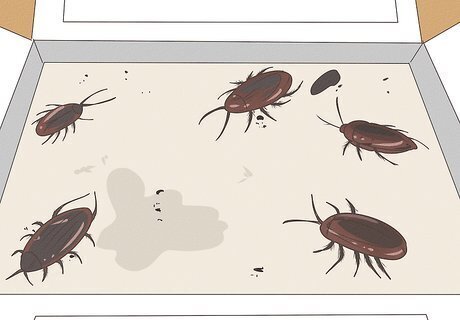
Cockroaches will get stuck as soon as they go in the adhesive traps. Set the traps wherever you’ve seen cockroaches, such as in your cabinets, under your sinks, or along the baseboards near entryways. Put the traps in each corner of the room and leave them out for 2–3 days before replacing them. In a pinch, make your own sticky traps by wrapping a piece of cardboard in duct tape so the adhesive is facing out. Keep track of how many cockroaches you catch on each trap so you can see what areas in your home have the biggest pest problems.
Dust diatomaceous earth into crevices.
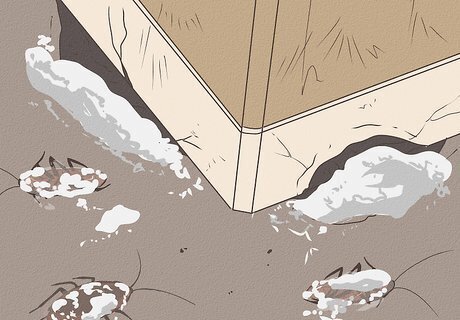
Cockroaches get dehydrated when they walk through diatomaceous earth. Use a bulb syringe to spread the diatomaceous earth. Apply a thin layer that’s barely visible around cracks and crevices so cockroaches have to walk through it. Try spreading it in other places too, such as underneath your sinks, along baseboards, and inside cabinets. Keep diatomaceous earth away from pets and other people since prolonged exposure could cause lung irritation.
Repel roaches with essential oils.
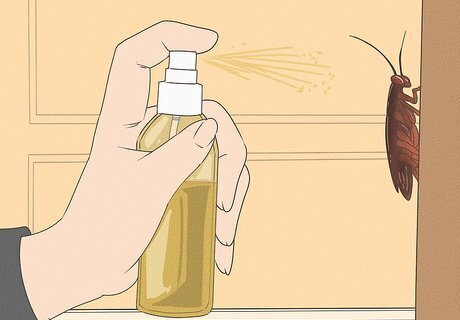
Certain essential oils are toxic to cockroaches. Look for thyme oil, clove bud oil, or citronella oil since they’re the most effective at getting rid of young cockroaches. Spray the essential oil directly on the cockroaches when you see them. Otherwise, just spread the oil around the baseboards where you’ve seen cockroaches most frequently to keep them away. Reapply essential oils once a week so they stay effective against roaches.
Sprinkle boric acid in cabinets.
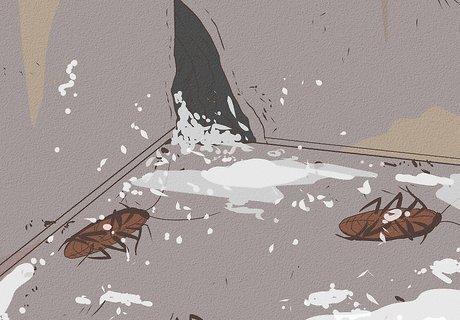
Boric acid causes the roaches in your home to starve. Dust a thin layer of the boric acid powder into the cracks around cabinets and baseboards. Leave the boric acid for about 1 week before vacuuming it up and replacing it. To attract more roaches to the boric acid, mix in 1 part powdered sugar or flour. Roaches will be drawn to the food source so they’re more likely to ingest the boric acid. Boric acid isn’t highly toxic to humans and pets, but try to use it only where the roaches will get to it to prevent exposure. Avoid using boric acid outside since it’s toxic to plants. Some people claim to kill roaches with baking soda, or by mixing baking soda and boric acid, but baking soda isn't an effective insecticide.
Seal cracks and entry points.
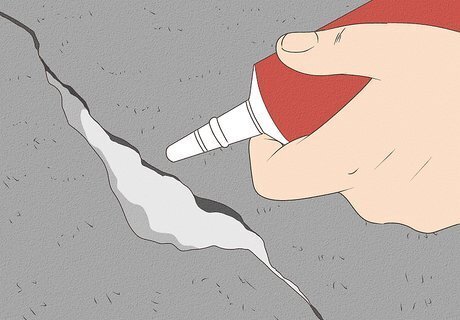
Sealing your home keeps roaches from getting inside. Look for cracks and crevices around your windows and doors, and fill them in with caulk. Then, install door sweeps and weatherstripping around any gaps at entryways. Be sure to check your home’s interior and exterior to ensure there aren’t any places roaches could squeeze in.
Store food in airtight containers.
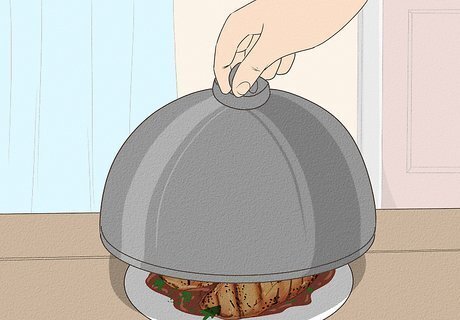
Cockroaches are drawn to any open food sources in your home. Rather than leaving food out in the open in your kitchen, store it in your fridge or airtight containers. Wipe up any food scraps and crumbs left on your countertops or stove so the roaches don’t come back. If you have a pet, check that their food is sealed and stored too so the roaches don’t get to it.
Get rid of standing water and leaks.
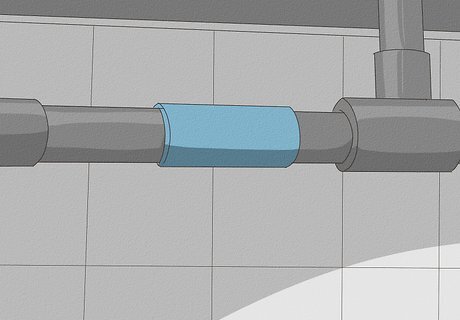
Roaches are less likely to stick around if they don’t have water. Search for water leaks in your house under your sinks and near any piping, and fix them as soon as you can. Then, just clean up spills right away so roaches aren’t drawn to the moisture. Avoid overwatering houseplants since roaches can be drawn to the water in the soil.
Take your trash out regularly.
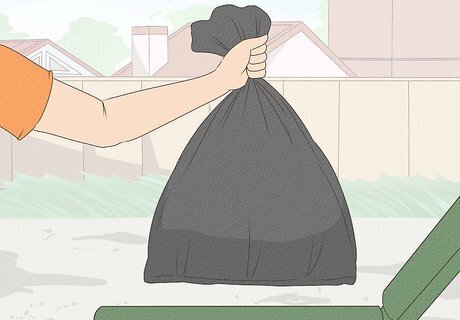
Cockroaches will gather around full trash cans. Keep your trash in a can with a lid so cockroaches can’t get to the food scraps inside. Try to take out the trash as soon as it’s full, or after a couple of days so it doesn’t spoil or attract any bugs. Tie up the trash bag and toss it in a receptacle that’s sealed and away from your home. Avoid storing lots of cardboard boxes near your trash can since they make perfect hiding spots for roaches.
Deep clean your home.
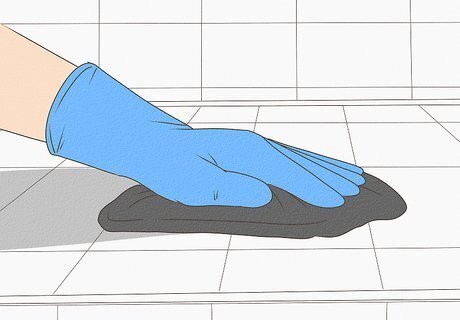
Cleaning up thoroughly eliminates food and hiding spots. Take a little bit of time throughout the week to clean up so you can keep the cockroaches away. Start in the kitchen by washing your dishes and putting away leftover food promptly. Sweep your floors to clean up crumbs on your floor, and mop them thoroughly to get rid of any residue that’s built up. Put things away in their proper places rather than leaving clutter since roaches could find new places to hide.
Get rid of outdoor clutter.
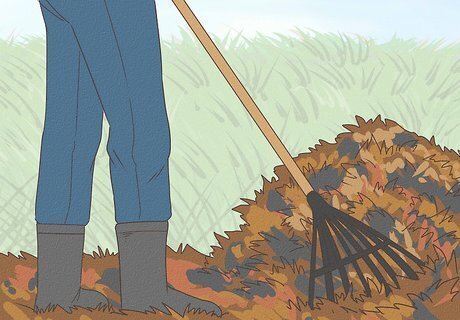
Debris outside your home may attract roaches from outside. Dispose of any leaf piles, grass clippings, and other yard waste since cockroaches are drawn to them. Trim back the plants around your home’s exterior and keep any piles of firewood a few feet away from the wall so roaches don’t have easy access inside. Be sure to clean your gutters and window wells since leaves and other debris could build up.




















Comments
0 comment